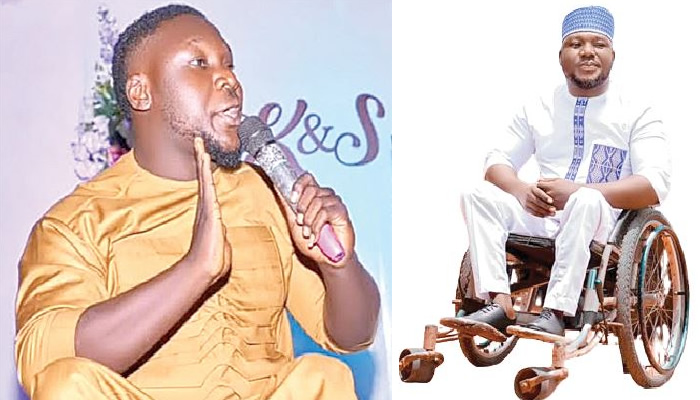
A physically challenged tech freelancer and Master of Ceremonies, Jemilu Akpa, from the Igala-speaking part of Kogi State, tells TEMITOPE ADETUNJI how he was almost thrown into the bush because of his disability
Can you take us through your history of disability?
My name is Jemilu Akpa. I’m from Kogi State, the Igala-speaking part of the state, from Ofu Local Government area. I am from a polygamous family. I am the third child from my mother’s side.
Taking you through the history of my disability, it happened the night when I was two years plus. According to my mother, I felt sick at night and was rushed to a nearby hospital (the name of the hospital was not revealed to me). I was wrongly injected, and it affected my bone, causing bleeding. I was rushed from one hospital to another.
After some weeks, they discovered that I was affected by the injection, which led to my disability. In the traditional setting where I come from, they believed I came with bad luck. They suggested that I be thrown into the bush for the gods to consume. But some individuals who believed a child living with a disability could become anything in life, motivated my father that I could become great in the future. I started school, sat on the bare floor, crawled to school, and crawled back. I couldn’t crawl back in the afternoon because of the scorching sun and would wait until the sun went down around 5pm to 6 pm before going back home. I was a brilliant person.
My life is a mixture of both positive and negative vibes. When I faced challenges, I always had a positive energy to emit. Growing up was extremely challenging but I had this self-confidence that one day, I will be great. I was that little boy who happened to be a victim of polio. Then, I found myself in a society with different socio-culture and traditions, where persons living with disabilities are considered a burden.
The societies that do not place value on persons with disabilities, where they feel you have nothing to offer to society. I grew up with this intrinsic feature where I have this inner belief that I’m going to be a successful person. I had this self-confidence that someday I was going to be great. Facing discrimination, bullying, family, environment, peer group, and all. My childhood was a mixture of bitter and sweet, but they moulded me into the person I am today. When I see the negative vibes of life, I learn from it, and likewise, the positive.
Can you recall any memorable life lessons or lessons?
I was taking control of the moment while God took care of the worries. In the second semester in 100 level, I got drenched by heavy rain on this faithful day. I was wheeling myself from school to my lodge. Everyone who came across this scenario got emotional and cried, but I laughed and felt less concerned about the drenching.
A friend, Yinka whom I put a call to for assistance because I could no longer wheel myself due to the heavy rain took me some shots and cheered me up. We laughed, had fun and he posted it with a funny caption. One of my biggest brothers and helpers saw this, and this incident brought changes to my life. I was given a motorcycle to ride to school when it seemed like everything was over, God usually comes through for me. During my difficult phases, I have never felt worried. I believe in God who is in charge. Most of my situations always turn in my favour.
How did you manage to go to lectures while you were in school?
When it seems like everything is over, God usually comes through for me. During my difficult phases, I have never felt worried. I believe in God who is in charge. Most of my situations always turn in my favour. I managed to attend classes using a tricycle, wheelchair, and motorcycle.
How old are you now?
I am 30 years old.
What role did your parents play in your journey as a physically challenged person?
I would give my parents a hand of applause, especially my mother; she has been a very committed woman. Even though I live with a disability, she has never treated me differently. She loves me. To date, I can say she loves me, and I love her too. The best thing that can happen to people living with a disability is having a family that understands you can become anything, and that believes disability is just a form of little deformity. My father and mother believed that someday, things would still work out. My mother has been very supportive, likewise my late dad. You know, men are very logical, while women are very emotional. So their contribution to my condition came from different perspectives. I normally take the first position, and when I did, my dad would shower me with money and gifts. I interpreted that he appreciated my growth and development.
Were you treated differently as a person living with a physical disability?
Well, in some cases, I was treated differently but not in all cases. It happens to others; I do hear about it, but from my personal experience, I can’t tell that I have been treated differently that much. Some are from my personal experiences, but I can’t say I’ve been excluded. But I’ve not been treated differently that made it affects my emotions. Most times, people living with a disability are treated differently because they are withdrawn. So until they show the stuff they are made up, people treat them like other able people. So if people see the potential in you, they celebrate you. Throughout my life journey, I wasn’t treated differently. I receive more attention because I always give my best.
Have you experienced any form of discrimination?
I can’t tell of any form of discrimination. When you talk about discrimination, it is very deep because people living with a disability, are so fond of an impression I try to correct. It is hard to correct the impression that we are being discriminated against. You can only talk about discrimination when we talk about infrastructures, such as churches, schools, mosques, event centers, and any social gathering that are not accessible. You are indirectly discriminating against people living with disabilities. I have a lot of success stories, and I take people unaware, so I’m hardly discriminated against. My reality is that nothing should stop me from what I intend to do. When the stages are not accessible, most of the time, what I do is find people to support you up the platform. What is most important is that you have a platform, a brand, something to tell, and a gift. I define my life, do, and the way I live. In terms of my love life, I don’t think anyone discriminates against me. People always want to be around me and be with me, so I hardly feel discrimination.
What is your level of education?
I’m a degree holder. I graduated from the then Kogi State University, Anyigba, now Prince Abubakar Audu University, Anyigba. I’m a graduate of English Literary Studies precisely. I graduated in 2019. I have some certifications in tech.
Do you have a memory of an able-bodied person that treated you specially?
I have lots of able people who treat me specially. It’s not like people don’t want or care about us. It is because so many people living with disabilities pay particular attention. So when you talk about people treating me in a special way, I’m always special everywhere. When it comes to performance, I always receive special treatment. I have people who always want me to be fine, mentally and emotionally. I have a lot of people who always treat me right. Others who always feel people don’t treat them right should be able to define what they mean by they are not being treated right and why they are not treated right. For instance, disability should not be a reason why you should be dirty or perceived as a beggar. I have a whole lot of people who are inspired by life and the personality I’ve built.
Are you in any relationship?
Yes, I’m in a very happy relationship.
Has your condition affected your romantic relationship negatively at any time?
It’s a no for me. If you talk about my condition affecting my relationship, you don’t expect everyone you ask to love you or date you. So most people who are in a relationship understand their feelings, but do they consider the feelings the other party has for you? People don’t love you because you are disabled; they love you because they see a special thing about you. I have to talk about myself, and I know most of what I want to say won’t go down well with others. I have to address the attitude as it has to do with us people living with disabilities. For example, you don’t expect a lady to come into your life without observing you. Whatever is strange to anybody requires a long time to observe. So most people feel their disability affects their romantic life because they always come in a rush.
What do you do for a living?
I am a master of ceremonies and also into tech. I have a computer cyber cafe named Smart Digital Cyberspace, a duly registered business with CAC. I am working with Accessibility Blueprint, USA.
Narrate your journey as a master of ceremonies?
The journey started years back when I attended boarding school. As a child living with a disability, I always had the desire to express myself, and the only platform available was through music. I love music because, like poetry, it allows me to express thoughts, ideas, pain, and experiences. I wanted to talk about people living with disabilities, share my own experiences of rejection and discrimination, and address societal issues. It all began in our compound when I had the opportunity to anchor an event beautifully with a microphone. The journey expanded, leading me to bigger events in Abuja, Lagos, Benue, and beyond.
Do you get work often, and are you being paid well?
Well, in my case, I haven’t actively sought jobs. I believe in realism and don’t rely on emotions or religious sentiments to secure employment. Society often perceives people with disabilities as burdens, but I have navigated this by engaging in various businesses. I started as a DJ, ventured into a cyber cafe, acquired digital skills, worked as a freelancer, and eventually entered the tech industry.
Who is your role model or mentor?
My role model is a disability advocate based in California, sharing similar views on success and independence for people with disabilities. I don’t believe disability should be an excuse for dependency, and my mentor inspires me to challenge societal perceptions.
What is his name?
Sheri Byrne Haber (Disabled), an accessibility expert and advocate, based in the United States.
Are you nursing any ambition beyond your work as an MC?
Lack of accessibility discourages me in the MC profession. I have shifted my focus to tech, recognising its importance in making environments more accessible and equal. Tech skills have become crucial for me. But I have not stopped being an MC; I still anchor events.
So how do you juggle your MC activities and tech together?
Master of ceremonies usually takes a day or two; most times, I do my tasks earlier before going to events. And sometimes, I do take permission to do the tasks in my free time, probably in the night after events.
How important do you think social media is to people living with a disability?
Social media is a great platform, and I have personally benefited from it, even connecting with my role model. It provides an avenue for individuals with disabilities to showcase themselves and attract opportunities. However, it should be used responsibly and not as a tool for exploitation or laziness.
What advice do you have for others living with disabilities?
My advice is to leverage social media to change your world, recognising the platform’s power to sell yourself. Be proactive, and driven, and avoid using it as a means of exploitation.
Do you think people in this part of the world treat people with physical disabilities well enough?
Accessibility is a significant issue in this part of the world, and blaming individuals is not the solution. The government’s role in providing accessibility is crucial. If taken seriously, accessibility can alleviate the challenges faced by people with disabilities and contribute to better treatment. Beyond disabilities, the majority of people in Nigeria are frustrated by the overall situation in the country. Managing people well and valuing diverse opinions are essential in fostering a more inclusive society.













